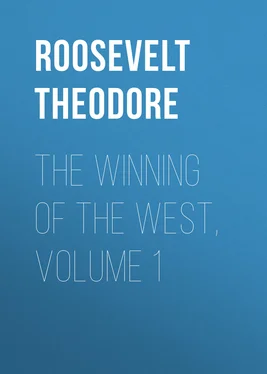Theodore Roosevelt - The Winning of the West, Volume 1
Здесь есть возможность читать онлайн «Theodore Roosevelt - The Winning of the West, Volume 1» — ознакомительный отрывок электронной книги совершенно бесплатно, а после прочтения отрывка купить полную версию. В некоторых случаях можно слушать аудио, скачать через торрент в формате fb2 и присутствует краткое содержание. Жанр: foreign_prose, История, foreign_edu, foreign_antique, на английском языке. Описание произведения, (предисловие) а так же отзывы посетителей доступны на портале библиотеки ЛибКат.
- Название:The Winning of the West, Volume 1
- Автор:
- Жанр:
- Год:неизвестен
- ISBN:нет данных
- Рейтинг книги:5 / 5. Голосов: 1
-
Избранное:Добавить в избранное
- Отзывы:
-
Ваша оценка:
- 100
- 1
- 2
- 3
- 4
- 5
The Winning of the West, Volume 1: краткое содержание, описание и аннотация
Предлагаем к чтению аннотацию, описание, краткое содержание или предисловие (зависит от того, что написал сам автор книги «The Winning of the West, Volume 1»). Если вы не нашли необходимую информацию о книге — напишите в комментариях, мы постараемся отыскать её.
The Winning of the West, Volume 1 — читать онлайн ознакомительный отрывок
Ниже представлен текст книги, разбитый по страницам. Система сохранения места последней прочитанной страницы, позволяет с удобством читать онлайн бесплатно книгу «The Winning of the West, Volume 1», без необходимости каждый раз заново искать на чём Вы остановились. Поставьте закладку, и сможете в любой момент перейти на страницу, на которой закончили чтение.
Интервал:
Закладка:
The first-comers around Marietta did, it is true, share to a certain extent in the dangers of the existing Indian wars; but their trials are not to be mentioned beside those endured by the early settlers of Tennessee and Kentucky, and whereas these latter themselves subdued and drove out their foes, the former took but an insignificant part in the contest by which the possession of their land was secured. Besides, the strongest and most numerous Indian tribes were in the Southwest.
The Southwest developed its civilization on its own lines, for good and for ill; the Northwest was settled under the national ordinance of 1787, which absolutely determined its destiny, and thereby in the end also determined the destiny of the whole nation. Moreover, the gulf coast, as well as the interior, from the Mississippi to the Pacific, was held by foreign powers; while in the north this was only true of the country between the Ohio and the Great Lakes during the first years of the Revolution, until the Kentucky backwoodsmen conquered it. Our rivals of European race had dwelt for generations along the lower Mississippi and the Rio Grande, in Florida, and in California, when we made them ours. Detroit, Vincennes, St. Louis, and New Orleans, St. Augustine, San Antonio, Santa Fe, and San Francisco are cities that were built by Frenchmen or Spaniards; we did not found them, but conquered them. All but the first two are in the Southwest, and of these two one was first taken and governed by Southwesterners. On the other hand, the Northwestern cities, from Cincinnati and Chicago to Helena and Portland, were founded by our own people, by the people who now have possession of them.
The Southwest was conquered only after years of hard fighting with the original owners. The way in which this was done bears much less resemblance to the sudden filling up of Australia and California by the practically unopposed overflow from a teeming and civilized mother country, than it does to the original English conquest of Britain itself. The warlike borderers who thronged across the Alleghanies, the restless and reckless hunters, the hard, dogged, frontier farmers, by dint of grim tenacity overcame and displaced Indians, French, and Spaniards alike, exactly as, fourteen hundred years before, Saxon and Angle had overcome and displaced the Cymric and Gaelic Celts. They were led by no one commander; they acted under orders from neither king nor congress; they were not carrying out the plans of any far-sighted leader. In obedience to the instincts working half blindly within their breasts, spurred ever onwards by the fierce desires of their eager hearts, they made in the wilderness homes for their children, and by so doing wrought out the destinies of a continental nation. They warred and settled from the high hill-valleys of the French Broad and the Upper Cumberland to the half-tropical basin of the Rio Grande, and to where the Golden Gate lets through the long-heaving waters of the Pacific. The story of how this was done forms a compact and continuous whole. The fathers followed Boon or fought at King's Mountain; the sons marched south with Jackson to overcome the Creeks and beat back the British; the grandsons died at the Alamo or charged to victory at San Jacinto. They were doing their share of a work that began with the conquest of Britain, that entered on its second and wider period after the defeat of the Spanish Armada, that culminated in the marvellous growth of the United States. The winning of the West and Southwest is a stage in the conquest of a continent.
CHAPTER II.
THE FRENCH OF THE OHIO VALLEY, 1763-1775
The result of England's last great colonial struggle with France was to sever from the latter all her American dependencies, her colonists becoming the subjects of alien and rival powers. England won Canada and the Ohio valley; while France ceded to her Spanish allies Louisiana, including therein all the territory vaguely bounded by the Mississippi and the Pacific. As an offset to this gain Spain had herself lost to England both Floridas, as the coast regions between Georgia and Louisiana were then called.
Thus the thirteen colonies, at the outset of their struggle for independence, saw themselves surrounded north, south, and west, by lands where the rulers and the ruled were of different races, but where rulers and ruled alike were hostile to the new people that was destined in the end to master them all.
The present province of Quebec, then called Canada, was already, what she has to this day remained, a French state acknowledging the English king as her over-lord. Her interests did not conflict with those of our people, nor touch them in any way, and she has had little to do with our national history, and nothing whatever to do with the history of the west.
In the peninsula of East Florida, in the land of the cypress, palmetto, and live oak, of open savannas, of sandy pine forests, and impenetrable, interminable morasses, a European civilization more ancient than any in the English colonies was mouldering in slow decay. Its capital city was quaint St. Augustine, the old walled town that was founded by the Spaniards long years before the keel of the Half-Moon furrowed the broad Hudson, or the ships of the Puritans sighted the New England coast. In times past St. Augustine had once and again seen her harbor filled with the huge, cumbrous hulls, and whitened by the bellying sails, of the Spanish war vessels, when the fleets of the Catholic king gathered there, before setting out against the seaboard towns of Georgia and the Carolinas; and she had to suffer from and repulse the retaliatory inroads of the English colonists. Once her priests and soldiers had brought the Indian tribes, far and near, under subjection, and had dotted the wilderness with fort and church and plantation, the outposts of her dominion; but that was long ago, and the tide of Spanish success had turned and begun to ebb many years before the English took possession of Florida 2 2 "Travels by William Bartram," Philadelphia, 1791, pp. 184, 231, 232, etc. The various Indian names are spelt in a dozen different ways.
. The Seminoles, fierce and warlike, whose warriors fought on foot and on horseback, had avenged in countless bloody forays their fellow-Indian tribes, whose very names had perished under Spanish rule. The churches and forts had crumbled into nothing; only the cannon and the brazen bells, half buried in the rotting mould, remained to mark the place where once stood spire and citadel. The deserted plantations, the untravelled causeways, no longer marred the face of the tree-clad land, for even their sites had ceased to be distinguishable; the great high-road that led to Pensacola had faded away, overgrown by the rank luxuriance of the semi-tropical forest. Throughout the interior the painted savages roved at will, uncontrolled by Spaniard or Englishman, owing allegiance only to the White Chief of Tallasotchee. St. Augustine, with its British garrison and its Spanish and Minorcan townsfolk, 3 3 Reise, etc. (in 1783 and 84), by Johann David Schopf, 1788, II. 362. The Minorcans were the most numerous and prosperous; then came the Spaniards, with a few creoles, English, and Germans.
was still a gathering place for a few Indian traders, and for the scattered fishermen of the coast; elsewhere there were in all not more than a hundred families. 4 4 J. D. F. Smyth, "Tour in the United States" (1775), London, 1784, II., 35.
Beyond the Chattahooche and the Appalachicola, stretching thence to the Mississippi and its delta, lay the more prosperous region of West Florida. 5 5 Do .
Although taken by the English from Spain, there were few Spaniards among the people, who were controlled by the scanty British garrisons at Pensacola, Mobile, and Natchez. On the Gulf coast the inhabitants were mainly French creoles. They were an indolent, pleasure-loving race, fond of dancing and merriment, living at ease in their low, square, roomy houses on the straggling, rudely farmed plantations that lay along the river banks. Their black slaves worked for them; they, themselves spent much of their time in fishing and fowling. Their favorite arm was the light fowling-piece, for they were expert wing shots; 6 6 "Mémoire ou Coup-d'Oeil Rapide sur mes différentes voyages et mon séjour dans la nation Creck, par Le Gal. Milfort, Tastanegy ou grand chef de guerre de la nation Creck et General de Brigade au service de la République Française." Paris, 1802. Writing in 1781, he said Mobile contained about forty proprietary families, and was "un petit paradis terrestre."
unlike the American backwoodsmen, who knew nothing of shooting on the wing, and looked down on smooth-bores, caring only for the rifle, the true weapon of the freeman. In winter the creoles took their negroes to the hills, where they made tar from the pitch pine, and this they exported, as well as indigo, rice, tobacco, bear's oil, peltry, oranges, and squared timber. Cotton was grown, but only for home use. The British soldiers dwelt in stockaded forts, mounting light cannon; the governor lived in the high stone castle built of old by the Spaniards at Pensacola. 7 7 Bartram, 407.
Интервал:
Закладка:
Похожие книги на «The Winning of the West, Volume 1»
Представляем Вашему вниманию похожие книги на «The Winning of the West, Volume 1» списком для выбора. Мы отобрали схожую по названию и смыслу литературу в надежде предоставить читателям больше вариантов отыскать новые, интересные, ещё непрочитанные произведения.
Обсуждение, отзывы о книге «The Winning of the West, Volume 1» и просто собственные мнения читателей. Оставьте ваши комментарии, напишите, что Вы думаете о произведении, его смысле или главных героях. Укажите что конкретно понравилось, а что нет, и почему Вы так считаете.












